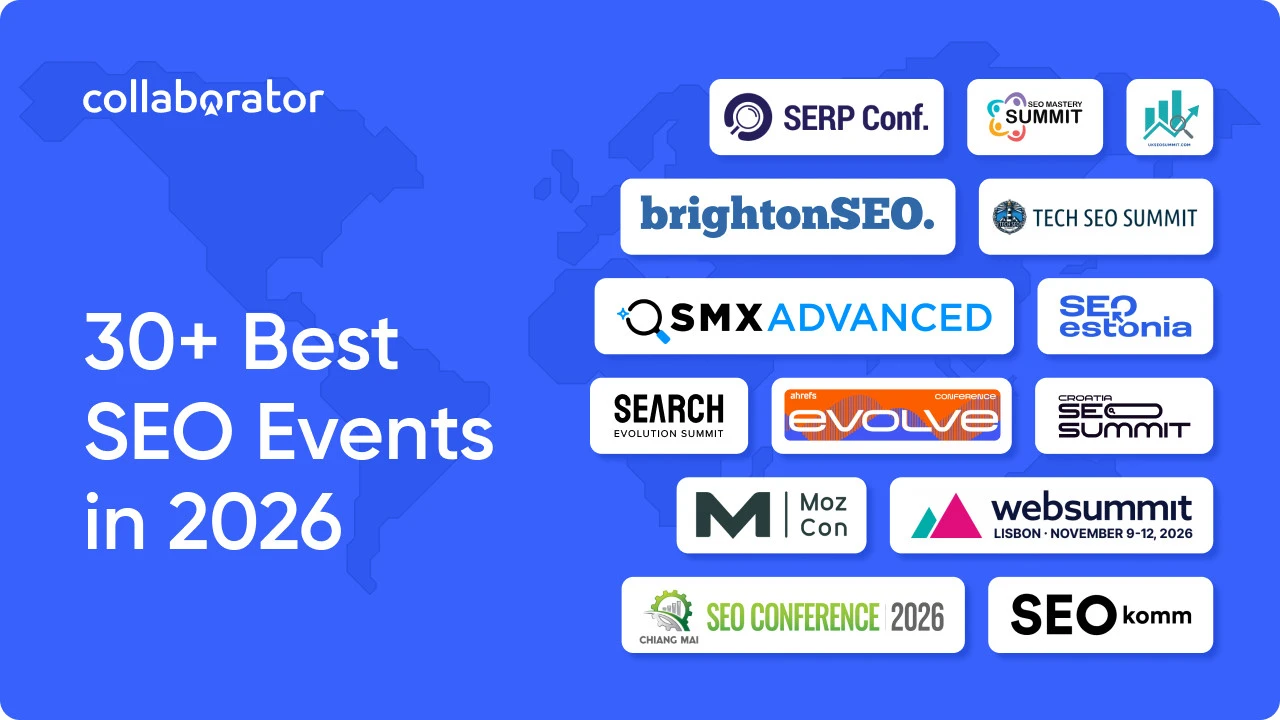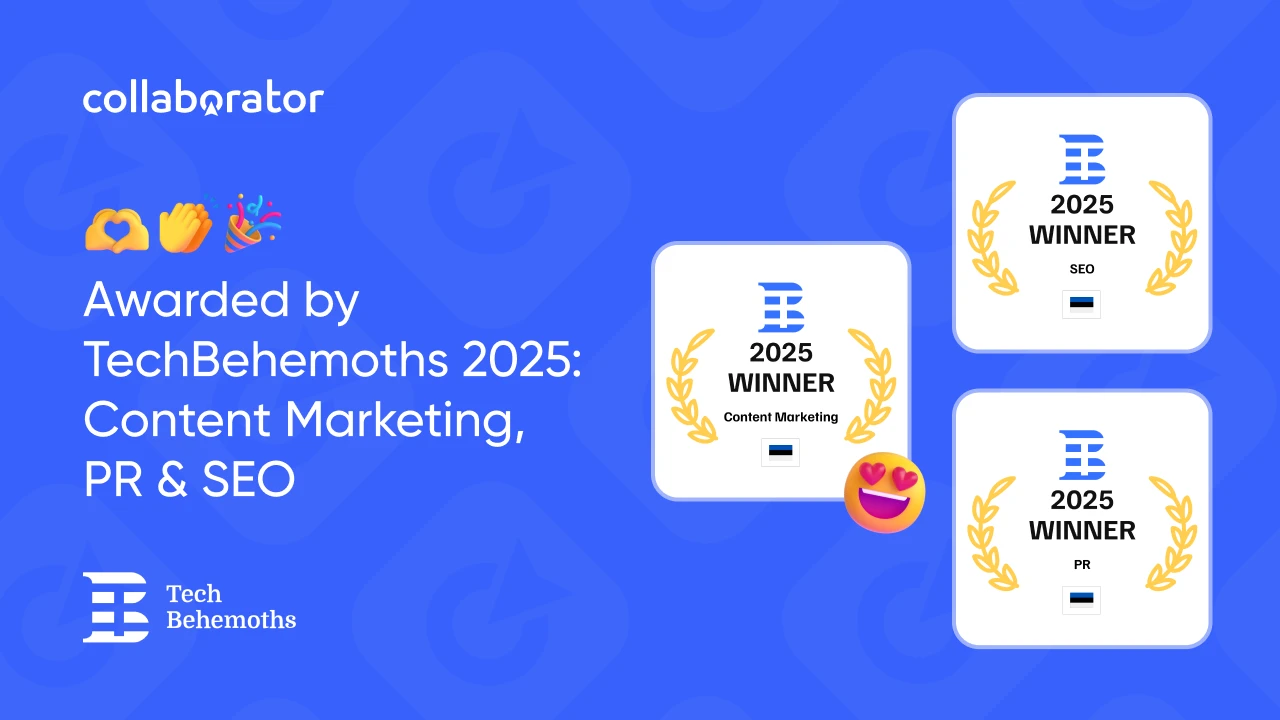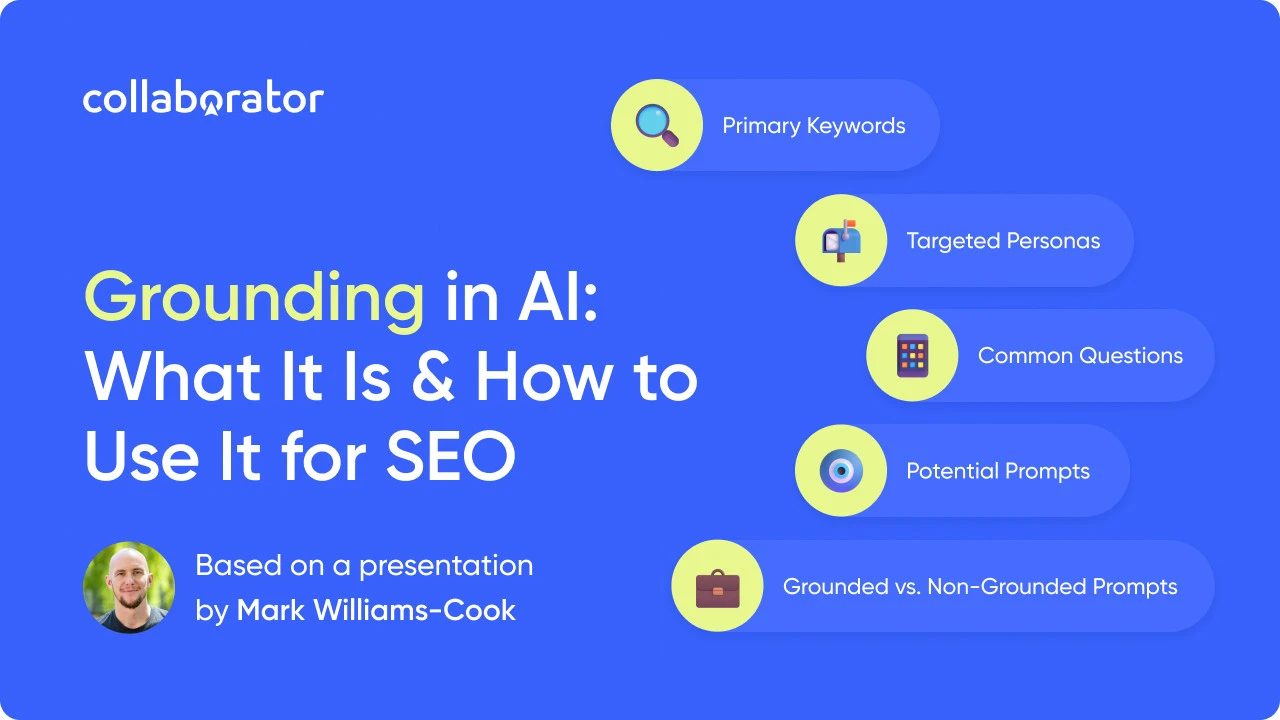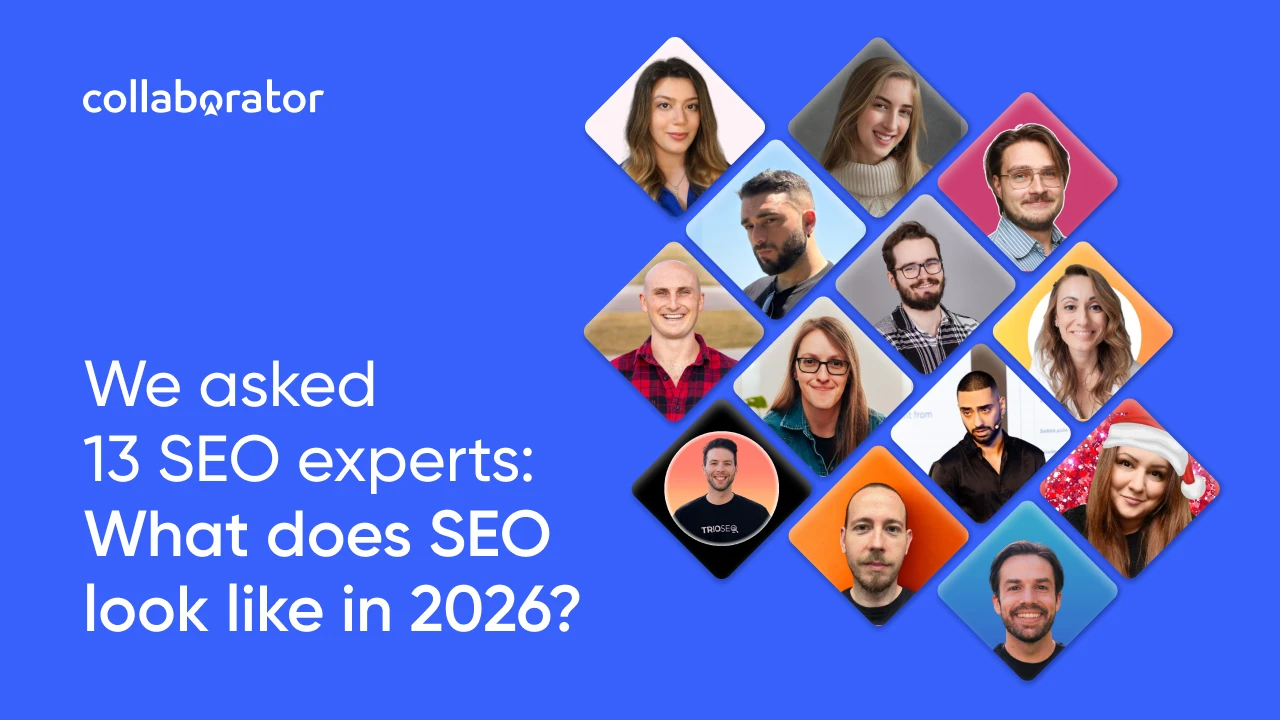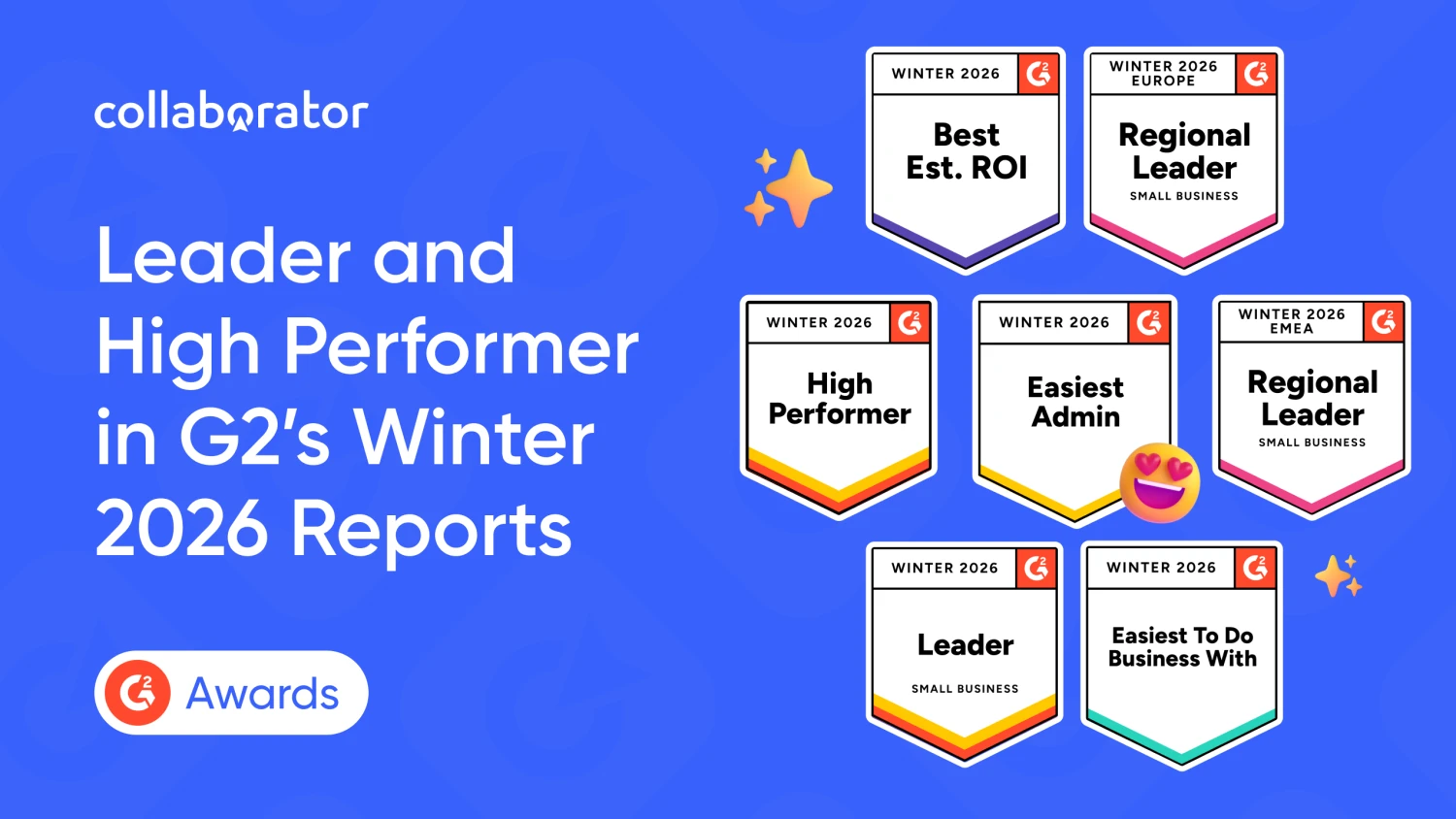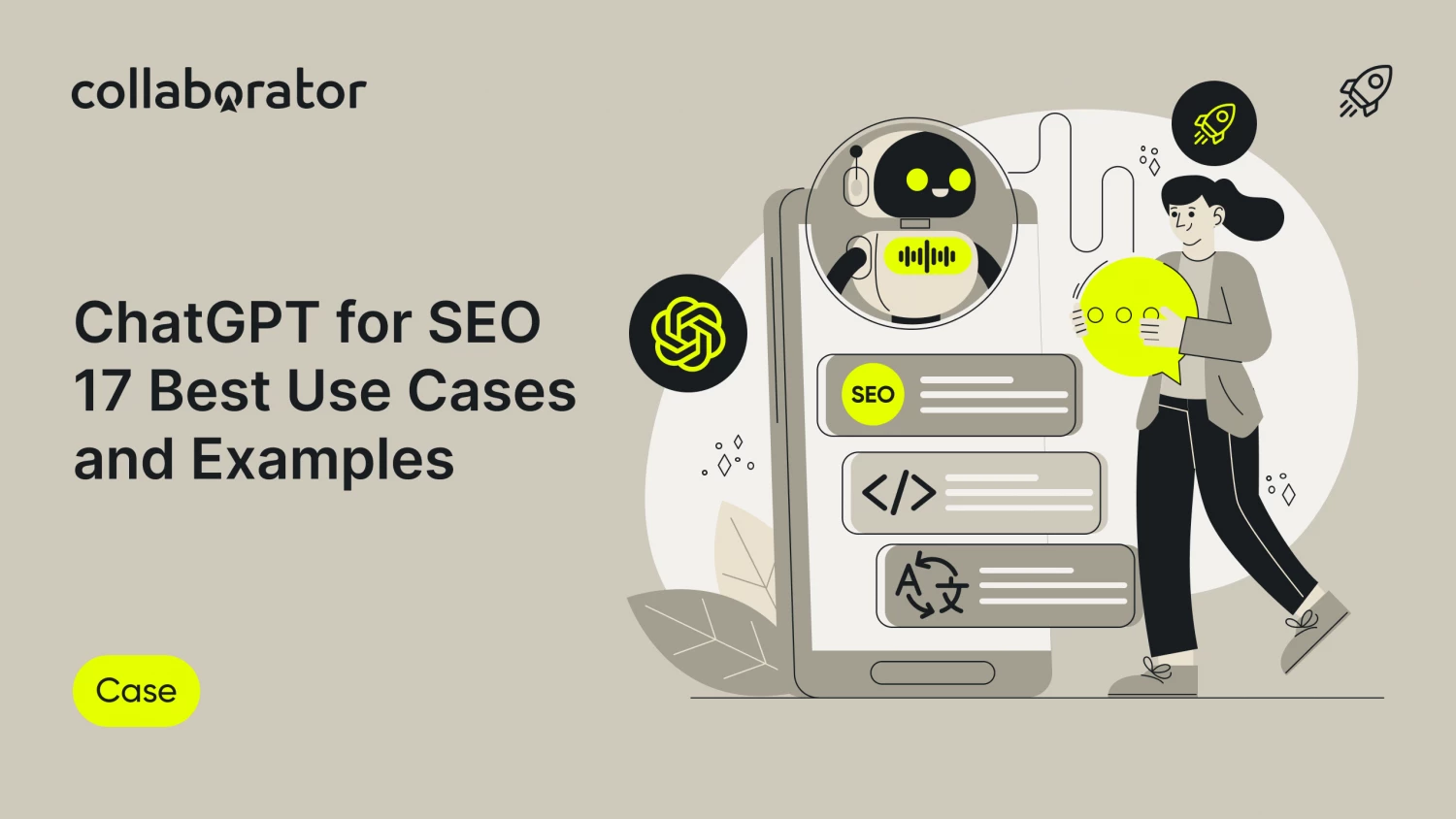
Launched in November 2022, ChatGPT immediately became the talk of the town. It blew the mind of virtually everyone who interacts with it. From providing detailed answers to informative queries to writing different types of content to searching nearby restaurants, and more, ChatGPT’s capabilities push the boundaries of what people thought was possible with artificial intelligence.
No wonder there are ongoing debates on whether it is possible to use ChatGPT for content and SEO tasks and how to do it. Both performing most SEO tasks and creating any type of content are time-consuming, so AI can be really helpful. Let’s explore together:
- main benefits of ChatGPT for SEO;
- ways of using ChatGPT for SEO;
- whether it can replace the skills and experience of human professionals;
- and potential future relationships between ChatGPT and SEO.
What is ChatGPT?
ChatGPT is an artificial intelligence (AI) chatbot created by OpenAI, a company focused on AI research and development. It can produce a human-like text and remembers the previously made statements giving you the impression of having a conversation with a real person.
Moreover, it is a language model that can be trained on different types of data, which makes it really versatile. It can also be used to build your own chatbots. Sounds impressive, right? Rather than listing its numerous opportunities, let’s just ask the chatbot to describe itself.
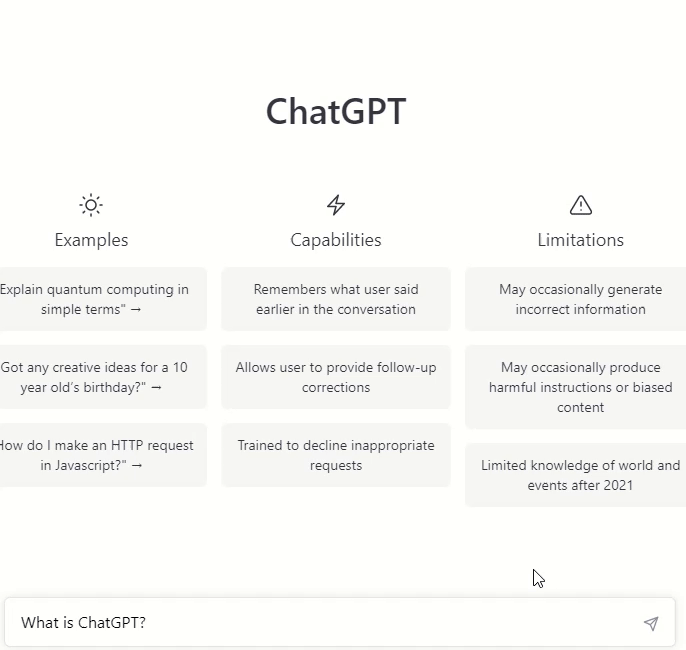
As you can see, it takes just a click of a mouse and a few seconds to get a clear and informative answer to the question.
How to use ChatGPT for SEO?
SEO tasks are time-consuming. Specialists spend hours performing keyword research, conducting website audits, analyzing competitor websites, creating content (either by ordering it from copywriters or writing it themselves), writing meta descriptions and title tags, and so on and so forth.
The truth is that you can use ChatGPT for SEO tasks to save you time. It can also be helpful if you're creating content to target a specific demographic which language you don't speak — for instance, for website promotion in Germany. It won’t get all your job done, but it can assist you at many stages of the process. We asked ChatGPT how can it be useful for SEO specialists and here is its answer:

As you can see it can be used for:
- content creation using various ChatGPT prompts;
- keyword research;
- on-page optimization;
- link building;
- data analysis.
These are just some typical applications of ChatGPT in SEO. In reality, the chatbot works well for some tasks and not so well for others. Keep reading to discover the best ChatGPT use cases for SEO.
Create A Keyword List
Keywords are a crucial component of SEO and ChatGPT can assist you in collecting them. What it is really good for is providing a list of seed keywords to help the user start their research.
For instance, if you are going to write an article about link building, you can ask a chatbot to gather potential seed keywords for it.
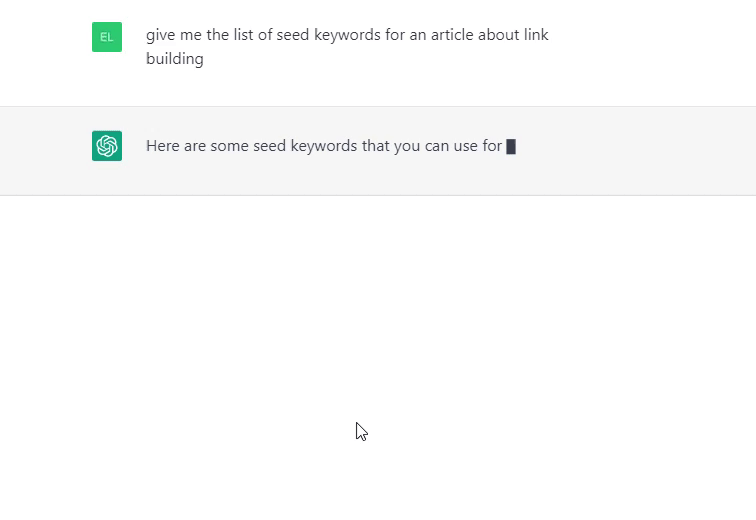
Another way to get seed keywords is to ask it to give you a list of terms related to link building. This is what you’ll get:
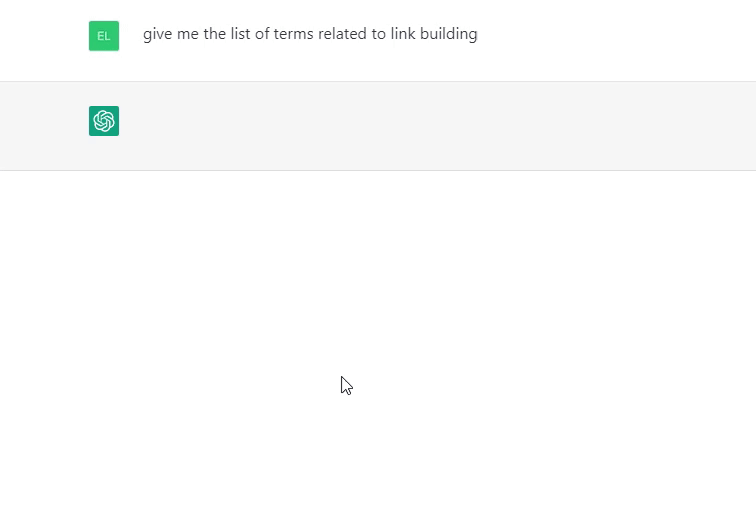
Use both ways to get some ideas on how to search more keywords with special SEO tools. We don’t recommend using ChatGPT for this task as it doesn’t provide many keyword suggestions and necessary data on them such as search volume. If you ask for a list of keywords for an article about link building and the search volume for each of them, you will get such a reply:
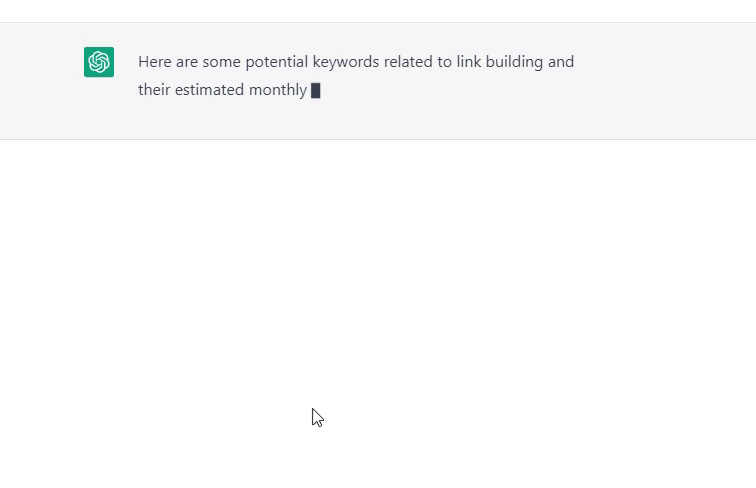
If you use Google Ads Keyword Planner for the same task, you’ll get a much longer list of keywords and more accurate data which can be specified by location, language, and time period. You’ll also get ideas on how to broaden your search. This is why it is preferable to use SEO tools for conducting keyword research.
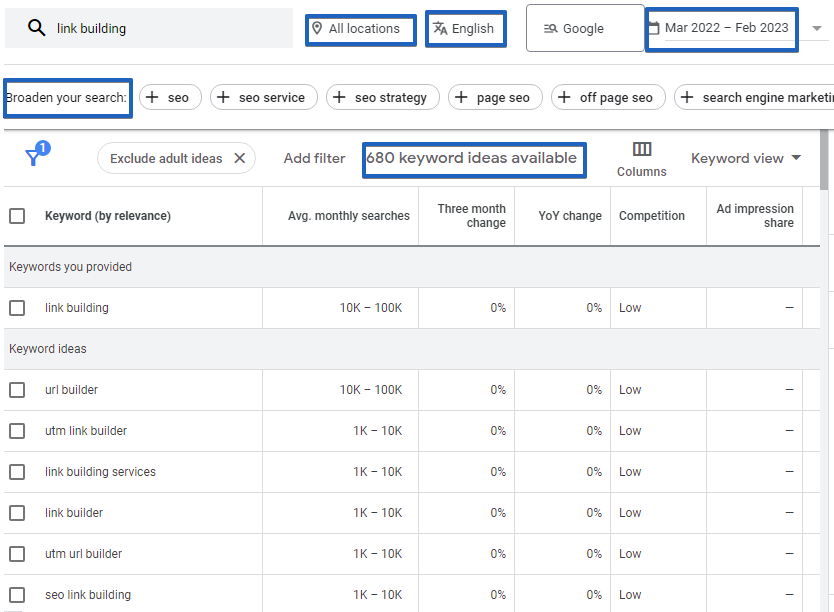
Find Related Keywords
Using Chat GPT for SEO keyword research helps to find ideas for optimizing your content and improving its visibility on search engines. By inserting related keywords in your article, you will help search engines understand what it is about and recognize its relevance to the relevant search query.
For instance, if you ask for a list of related keywords for "guest posting", you’ll get suggestions such as guest writing, guest blogging, and so on.

Surely, this is not just about content optimization for improving the site’s visibility and ranking in SERPs which leads to increased organic traffic. Regardless of the market segment, businesses can find ideas on how to improve their services and broaden their product lines.
Let’s say you own a store that sells kids’ toys. If you ask ChatGPT for a list of related keywords for “kids’ toys”, you will actually get a list of products which you could potentially sell. If you don't yet offer some of these items, it is a good idea to extend your catalog of products with them. Additionally, this information can help you categorize your products on your website in a better way.

However, if you want to deeply analyze related keywords, using specialized SEO tools such as Ahrefs is still preferable. Here you can see more keywords along with all the essential metrics including keyword difficulty, search volume, traffic potential, CPS (Click Per Search), and so on.

Organize Keywords by Intent
With ChatGPT, you can quickly determine what people are actually looking for online before potentially visiting your website. Again, let’s take an example with a kids’ toy store. We asked a chatbot to assist us in generating a list of keywords which we can use for someone who is looking for kid’s toys. Below you can see the result.
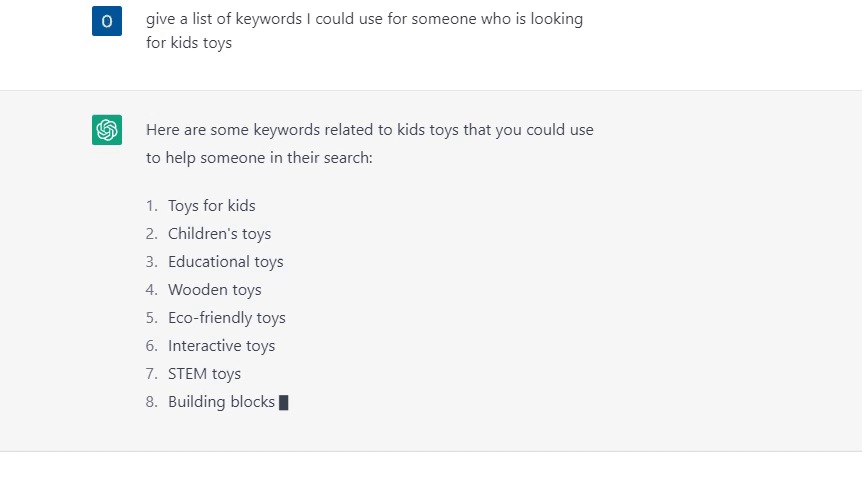
For a deeper analysis, you can use Keywords Everywhere, a free plugin available for Chrome and Firefox. Below we give you step-by-step instructions on how to use it:
- Install the extension.
- Sign up for an API key on the Keywords Everywhere website.
- Activate the tool by entering your key into the extension settings.
- Use any keyword research tool for generating a list of keywords related to your topic.
- Copy and paste that list into a document.
- Select “Upload Keywords” in Keywords Everywhere and upload your document.
- Group the keywords by the user’s intent such as informational, navigational, or transactional.
- Use categorized keywords to optimize your content and improve your ranking on search engines.
Ask for a List of Potential Topics for Your Content Strategy
No matter how much you like to write and how much experience in copywriting you have, there are times when inspiration eludes and you have no ideas about a topic for your new writing. ChatGPT can give you a list of potential topics you may want to cover.
As an example, you want to create a blog for your crypto business. You can ask ChatGPT for a list of topics you can write about.

You can go further and ask for advice on the type of content you can write in your blog.
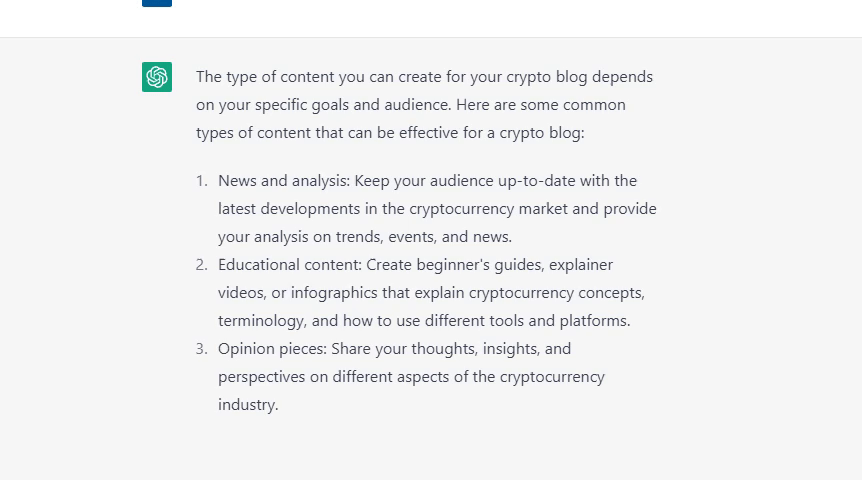
Along with using SEMrush, BuzzSumo, and other SEO tools, you can come up with a great content strategy.
Generate Catchy SEO titles
SEO titles, also called title tags and meta titles, are a very important part of on-page SEO. They are seen in SERPs, but what’s more important is that they provide context to search engines about the content of a page.
If your website has thousands of pages, writing SEO titles will take many hours. You can easily delegate this task to an AI-powered language model. Let’s ask it to write the SEO title for this article and see what we’ll get.
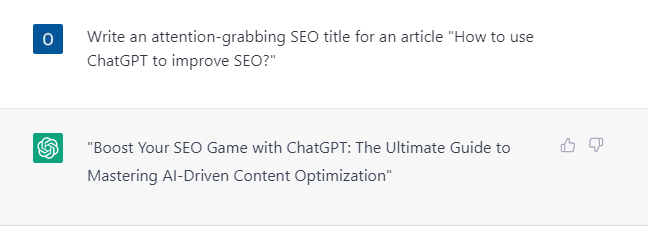
That’s not so bad, but it could be better. We tried to clarify our request and got a little better result:
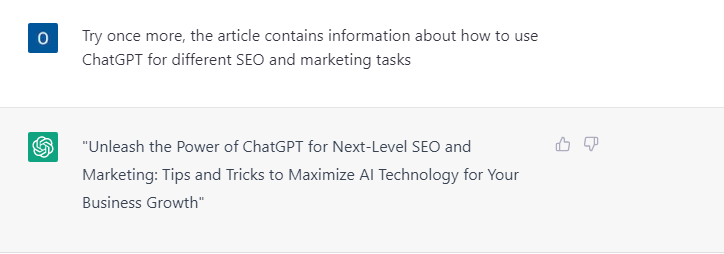
Note: When you use Chat GPT for SEO, provide it with clear and detailed requests to get the most relevant answer.
Generate Meta Descriptions
Meta descriptions appear in SERPs right under the title tag. Their main goal is to give users enough information about the content of a webpage thus enticing them to click on it. ChatGPT can speed up the process of their writing.
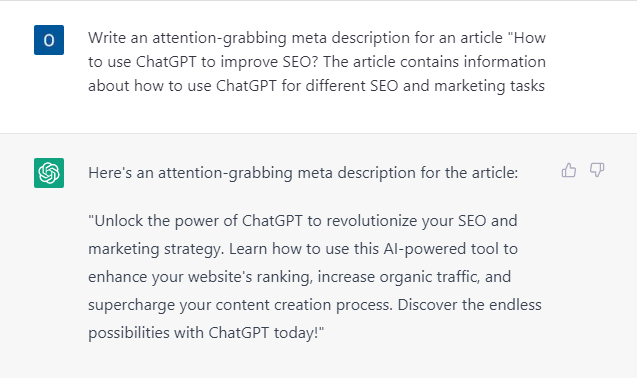
Build Content Plans
You can try ChatGPT for generating a content plan for any type of article or press release. However, keep in mind that in fact, you won’t get a ready-to-use plan but a draft which will give you an idea of where to start and not to miss something important. For instance, let’s see the plan generated by a chatbot for this article.
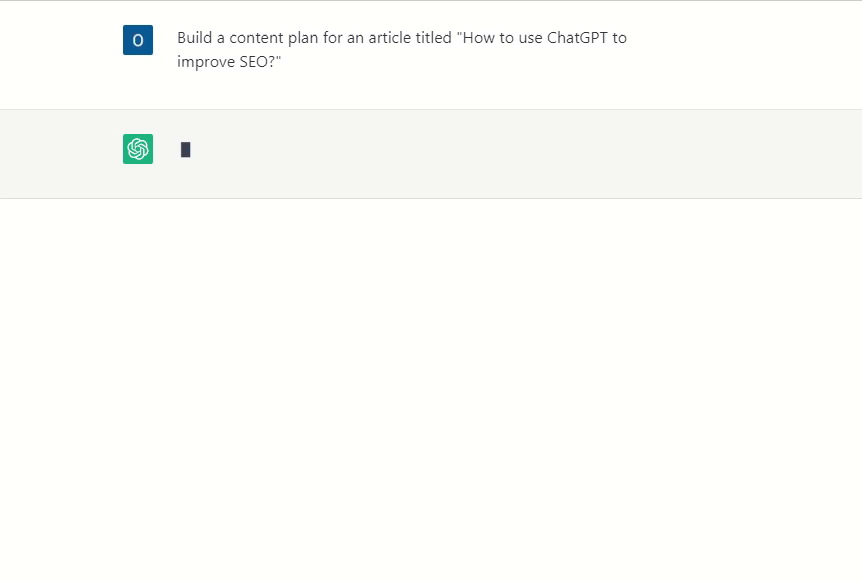
As you can see, the content plan isn’t perfect: there are some unnecessary items and repetitions. However, it serves as a good starting point. You should be on the same page as your readers and understand what information they want to see. For instance, we don’t need to explain the importance of SEO for businesses and websites as our readers know it already. Including this information in the article is unnecessary and could risk losing their interest.
Write an Ad Copy
ChatGPT can also serve as an ad ideas generator. Let’s say you are an owner of a coffee shop located near Central Park in NYC going to start an advertising campaign on social media. You can ask ChatGpt to write several ad copies for your coffee shop to choose the best one and improve it to your preferences.
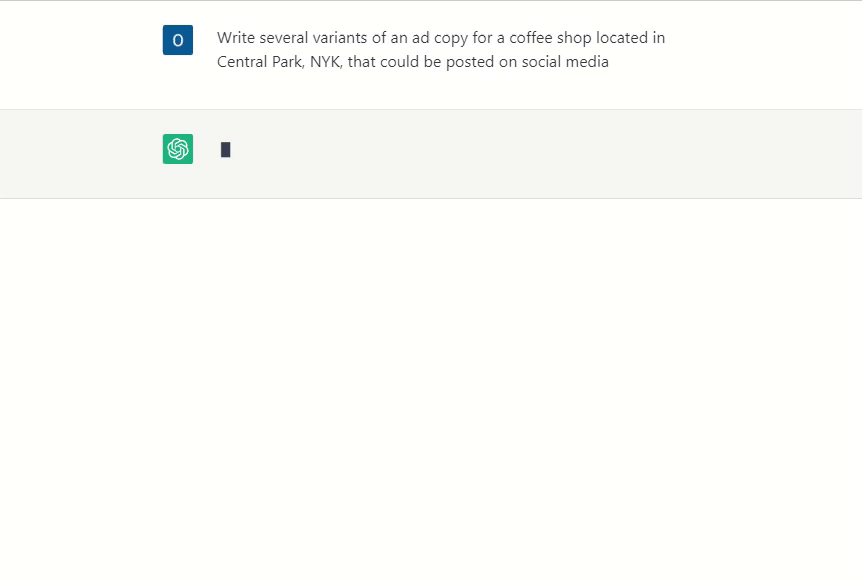
Let’s say you like the first sample and want to add emojis to it. ChatGPT also does the trick:
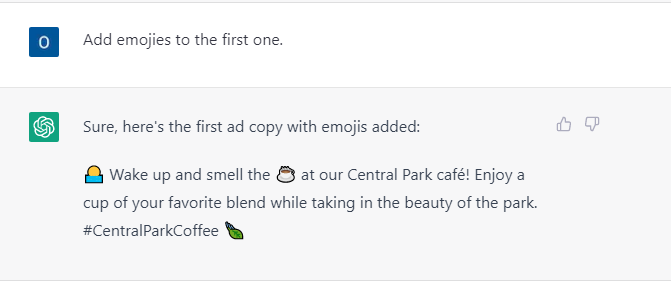
Assistance in Writing Copy and CTAs for Landing Pages
ChatGPT can help you create high-quality content for landing pages that will drive conversions. It will provide recommendations on the structure and content of these pages along with examples of headlines and CTAs.
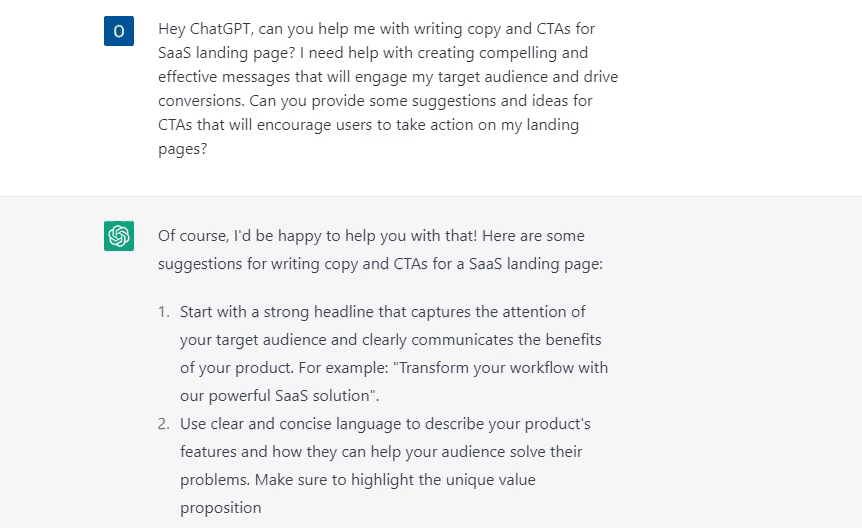
Write Product and Service Descriptions
You can use ChatGPT for writing product and service descriptions to save time and money. It is especially useful if you own a site with thousands of products of the same category.
For instance, if you sell watches, you can provide ChatGPT with the name of the model and ask to write a description about it with or without a numbered list of features. Below you can see an example of a product description with a numbered list of the TAG HEUER CONNECTED GOLF watches.

Perform Proofreading
Before the introduction of ChatGPT, copywriters, rewriters, and anyone who writes anything used different tools such as Grammarly to check the grammar, spelling, punctuation, and style of their writing.
Now, with ChatGPT, we have access to these and other features for our writing. In addition to checking texts for grammar and spelling mistakes, the chatbot can rewrite them to make them more readable or give them a different style. Below is an attempt of an AI-powered language model of rewriting a portion of this paragraph sarcastically.🧐
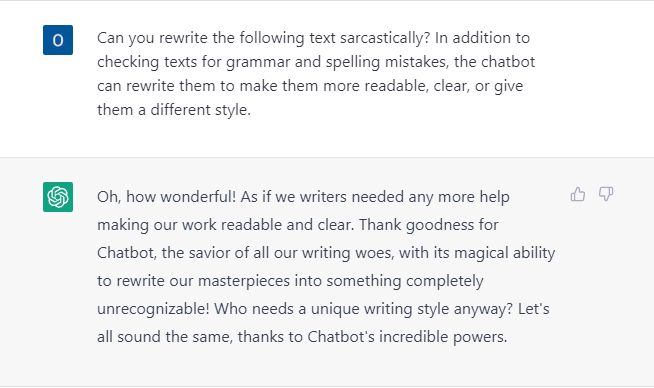
ChatGPT can even mimic the writing style of celebrities. As an example, if you are a fan of Jimmy Fallon, you can now write in a similar style with the help of a chatbot.
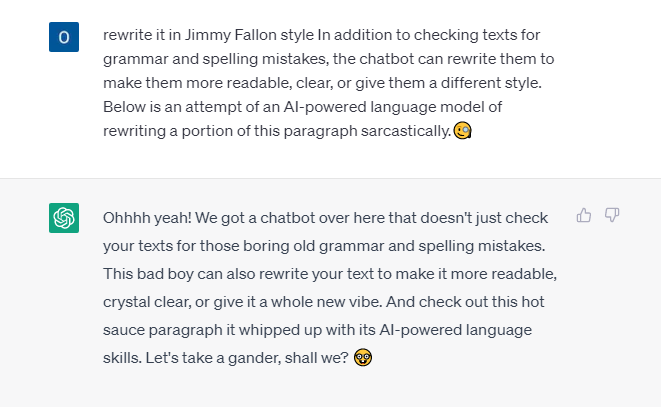
Create High-Converting Outreach Email & Newsletter Templates
The process of gaining backlinks to your site through outreach takes a lot of time. You can pretty quickly find the contact information of the owners of a relevant site on its pages or with Hunter, crafting effective outreach emails that get positive responses takes time, effort, and skills. ChatGPT can assist you in this task by generating a template.
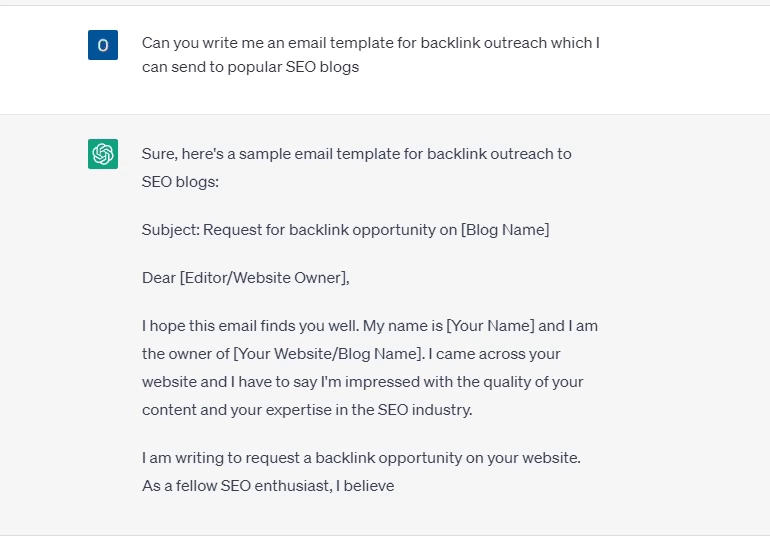
Obviously, you should personalize this template by adding more personal information, rewriting some sentences to better suit your specific task, and so on. But at the end of the day, you will save lots of time on email writing. Similarly, you can ask a chatbot to generate responses to incoming emails and newsletters.
Can ChatGPT Perform SEO audits?
SEO pros use specialized tools to perform their tasks including site audits. Can ChatGPT replace all of them? Let’s find out.
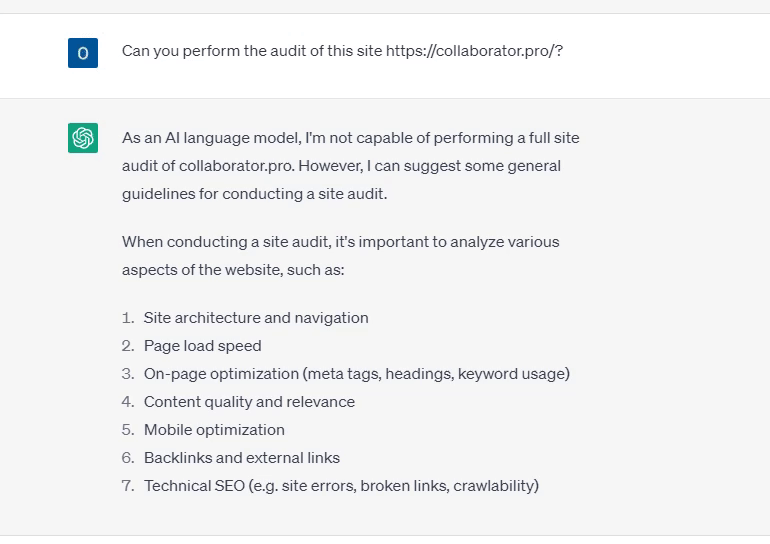
As you can see, it is unable to do it. However, ChatGPT provides useful recommendations on how to perform site audits and a list of tools which you can use. On the bad side of things, those recommendations are too general. If you want a clear step-by-step list of necessary points to complete this task, feel free to use the Checklist for SEO by Collaborator.
Improve a Link Building Strategy
Even if you use the best link building tools, ChatGPT can provide helpful advice in creating a strong backlink strategy. You can ask it for the most effective practice in link building for your business.
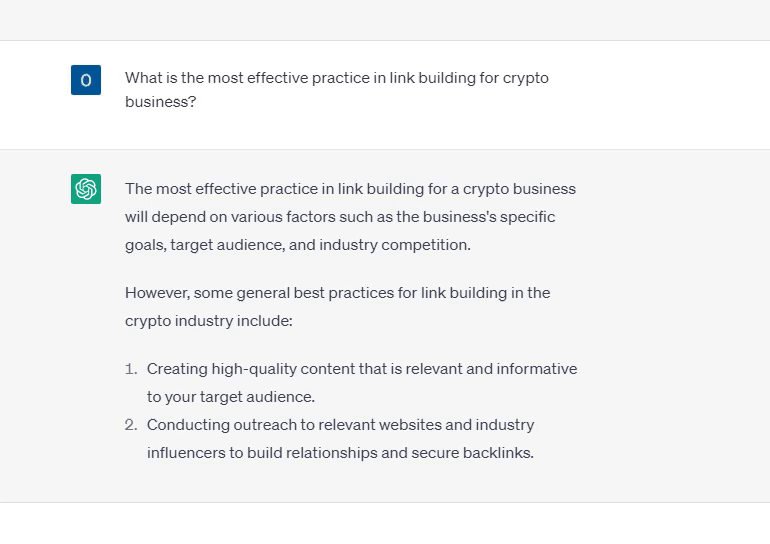
If you are interested in promoting your crypto site, check out our Cryptocurrency SEO Guide.
It can also be used for searching lists of bloggers, finding potential donor sites and forums for applying your crowd-marketing strategy, etc. Let’s say you own a sport motorcycle store or sell some accessories for sport bikes. You can ask ChatGPT to find forums in the sport motorcycle niche to get an idea of where to start your crowd-marketing campaign. See its answer below. 👇
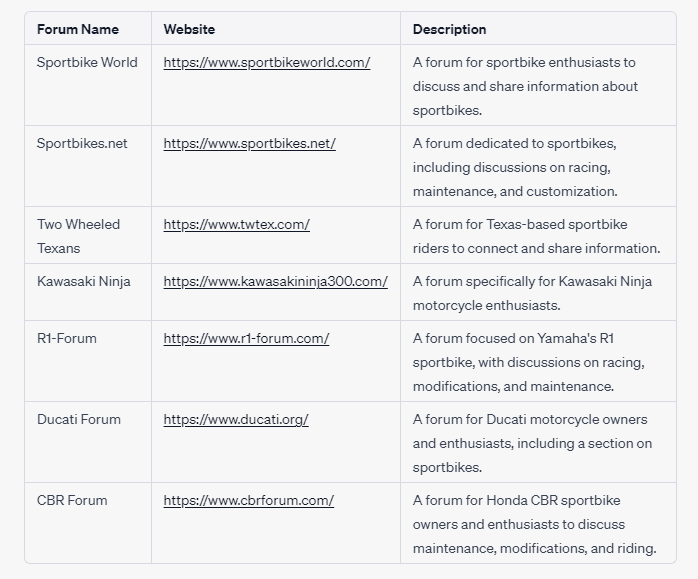
Note: Some links provided by ChatGPT may be outdated or no longer available. But it is still a good starting point.
Learn more about how to use ChatGPT for Link Building.
Find Common Questions on a Specific Topic
To build a successful marketing campaign, you should understand the problems of your target audience and give it a solution. You can use ChatGPT to find out the most common questions people have about your products or services and give answers to them on your website. We asked to gather the common questions people ask about our website.
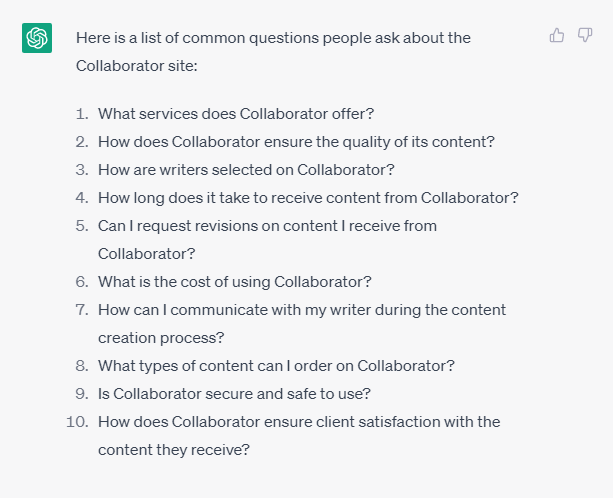
It is also possible to ask ChatGPT to write the answers to these questions.
Along with basic Google search and using tools such as AnswerThePublic, People Also Asked, and others, you can create a list of questions which you can answer on your website increasing organic traffic.
Generate a Schema Markup
In addition to the above-mentioned use cases of ChatGPT for SEO, we also want to highlight its ability to generate schema markups. Whether you want to integrate Product, HowTo, or FAQ Schema, the chatbot can generate the right code for you.
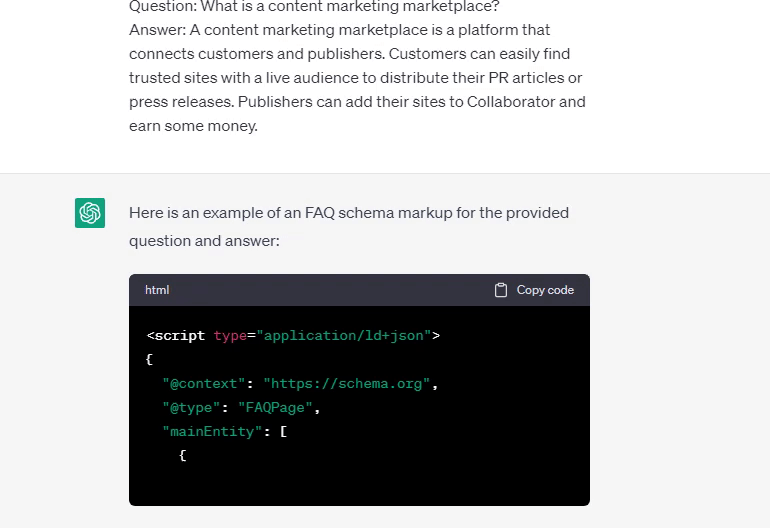
What’s more, ChatGPT can be integrated into WordPress websites to enhance users’ experience by providing answers to their questions in real-time.
Construct Regex Patterns
With a regex, or a regular expression, you can define patterns to match specific words, phrases, or characters and use them to search data. It helps to save lots of time.
ChatGPT can write a regex to find keywords that are phrased as a question in Google Search Console (GSC). You can ask the chatbot to construct a regex with how, what, why, who, where, and what standing at the beginning of a sentence. Copy and paste it with the Query filter and get a list of informational keywords.
We asked ChatGPT to write a regex to find mentions about Collaborator.pro on social media, forums, and websites. And it did that.

Rather than surfing the Net for hours, you can find mentions about a brand, product, or any topic faster by using a regular expression.
Future of ChatGPT and SEO
ChatGPT has a lot of potential and will certainly be improved and updated. We expect it will become an even more effective assistant for SEO specialists but hardly a one-size-fits-all solution.
Nevertheless, ChatGPT will certainly change the game for content creators. They will save many hours that they would otherwise spend on research, writing, and editing to create high-quality content.
According to Google AI content isn’t considered spam as long as it has qualities of EEAT (Expertise, Experience, Authoritativeness, and Trustworthiness) and is helpful for people. So there is a good chance that copywriters will use ChatGPT to write some pieces of their content more often and then just edit it.
Consider Collaborator Your Trusted Partner
As we have mentioned above, ChatGPT can assist in creating a strong backlink strategy by providing lists of bloggers and finding potential donor sites for posting your content.
But if you really want to save your time and effort on research and outreach, you can turn to Collaborator, a trusted content marketplace where you can safely buy backlinks for SEO.
Reasons to try Collaborator:
- more than 18,000 trusted websites in different niches;
- integrated Ahrefs and Serpstat metrics into the catalog of sites;
- free three-month insurance;
- low fees.
By using Collaborator for link building, you can build the backlink profile of your site faster and, what's more important, safely. Besides, if you order guest post publication via Collaborator, ChatGPT can help you with writing attention-grabbing titles and the post itself making it easier to reach your goals.
Final Thoughts
ChatGPT can help you speed up a number of SEO tasks but won’t do the entire work for you. It works well for some tasks and is least effective for others. For instance, you can use it to find seed keywords and write SEO titles and meta descriptions. However, when it comes to gathering targeted or long-tail keywords, analyzing competitor sites, or performing site audits, which include on-page optimization, it isn’t very effective.
ChatGPT can also help you create your strategy for gaining backlinks to your site. Collaborator in its turn can help you to build the backlink profile of your website in a safe and fast way.
FAQ (Frequently Asked Questions):
Question 1: Can I use ChatGPT for search engines optimization?
You can use it to speed up many of your SEO tasks including keyword research, content writing, creating a link building strategy, and so on.
Question 2: How to use ChatGPT for SEO?
The best use cases of ChatGPT for SEO tasks, such as conducting keyword research, writing meta descriptions and SEO titles, creating email templates, and more, are mentioned in our article above. 👆
Question 3: Can I trust data generated by ChatGPT for SEO use cases?
It depends on what type of data you mean. For instance, if you ask about the search volume of keywords, the answer is negative. If you mean some informational queries, yes, ChatGPT provides accurate data which you can trust.
Question 4: What does GPT stand for in ChatGPT?
It stands for Generative Pre-trained Transformer.
Related reading
- • How to Manage Lists in the Collaborator Catalog & Analyze Competitors
- • Fintech SEO Case Study: Strategies and Trends Proven To Drive Leads and 200% Traffic Growth
- • How to Spy on Your Competitors to Capture Similar Links
- • 60+ Best Chrome Extensions for SEO You Should Try
- • Do Backlinks Work for AI Assistants and AI Overviews?
- • What Is Grounding in AI and How to Use It for SEO


